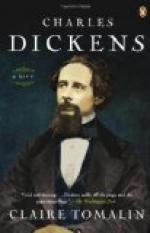I shall not quote the autobiographical passages in “David Copperfield” which bear on the difficulties of stenography. The book is in everybody’s hands. But I cannot forego the pleasure of brightening my pages with Dickens’ own description of his experiences as a reporter, a description contained in one of those charming felicitous speeches of his which are almost as unique in kind as his novels. Speaking in May, 1865, as chairman of a public dinner on behalf of the Newspaper Press Fund, he said: “I have pursued the calling of a reporter under circumstances of which many of my brethren at home in England here, many of my modern successors, can form no adequate conception. I have often transcribed for the printer, from my shorthand notes, important public speeches, in which the strictest accuracy was required, and a mistake in which would have been, to a young man, severely compromising, writing on the palm of my hand, by the light of a dark lantern, in a post-chaise and four, galloping through a wild country, and through the dead of the night, at the then surprising rate of fifteen miles an hour. The very last time I was at Exeter, I strolled into the castle-yard there to identify, for the amusement of a friend, the spot on which I once took, as we used to call it, an election speech of my noble friend Lord Russell, in the midst of a lively fight maintained by all the vagabonds in that division of the county, and under such pelting rain, that I remember two good-natured colleagues, who chanced to be at leisure, held a pocket-handkerchief over my note-book, after the manner of a State canopy in an ecclesiastical procession. I have worn my knees by writing on them on the old back row of the old gallery in the old House of Commons; and I have worn my feet by standing to write in a preposterous pen in the old House of Lords, where we used to be huddled together like so many sheep, kept in waiting, say, until the woolsack might want re-stuffing. Returning home from excited political meetings in the country to the waiting press in London, I do verily believe I have been upset in almost every description of vehicle known in this country. I have been, in my time, belated in miry by-roads, towards the small hours, forty or fifty miles from London, in a wheel-less carriage, with exhausted horses, and drunken postboys, and have got back in time for publication, to be received with never-forgotten compliments by the late Mr. Black, coming in the broadest of Scotch from the broadest of hearts I ever knew.”
What shall I add to this? That the papers on which he was engaged as a reporter, were The True Sun, The Mirror of Parliament, and The Morning Chronicle; that long afterwards, little more than two years before his death, when addressing the journalists of New York, he gave public expression to his “grateful remembrance of a calling that was once his own,” and declared, “to the wholesome training of severe newspaper work, when




